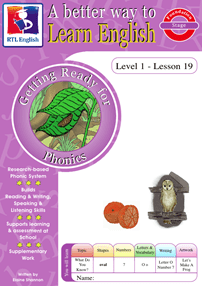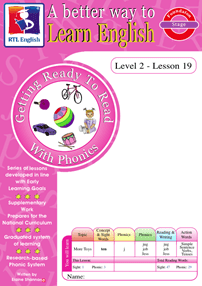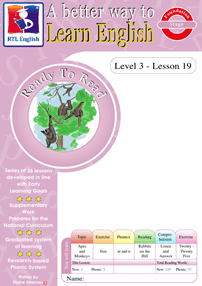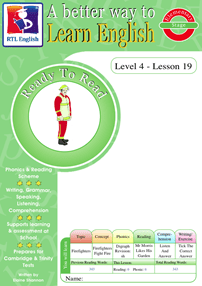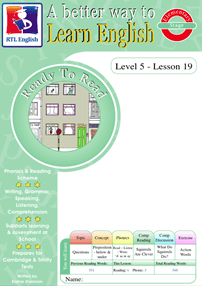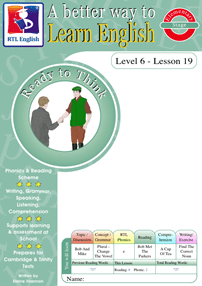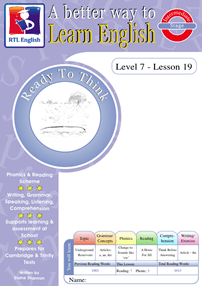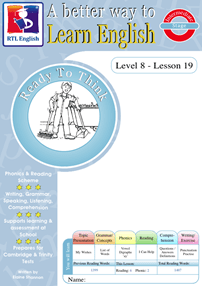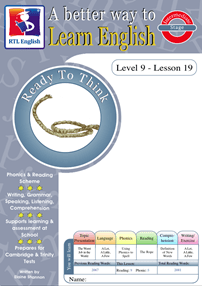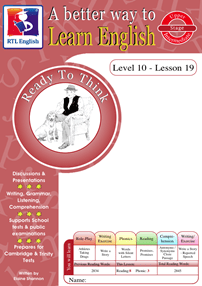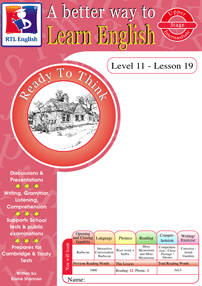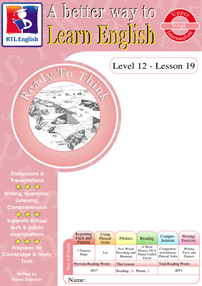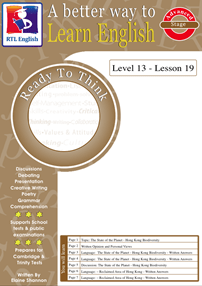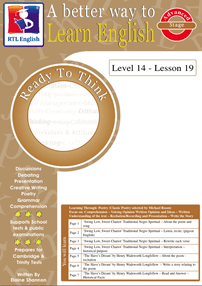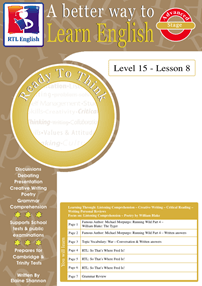English lessons for kids in Barrow-in-Furness, Cumbria

RTL English will help you teach English to your child or student in Barrow-in-Furness.
RTL English helps parents, tutors and teachers to teach English to children aged 3 to 18 years old, so that they can excel at school, in exams & beyond.
Our step-by-step, downloadable workbook lessons are print-ready & easy to teach. They are part of a award-winning teaching system that’s been taught millions of times, & proven over 24 years in 26 countries worldwide.
Our workbooks will help your child to catch up, keep up & stay ahead! Our lessons also challenge more advanced students; so whatever your son or daughter’s ability, there’s sure to be an RTL English lesson that’s suitable for them.
RTL English is a premier English language teaching organisation that’s recognised around the globe for its transformational and proven method of teaching English to students.
For over 20 years, RTL English has been taught in tutorial centres, homes & at schools both as part of the curriculum and as a supplementary activity. RTL English is growing in popularity worldwide, so why not join 1000000’s of parents, tutors & teachers around the world and teach your child RTL English today?
Teaching your child to use English competently might very well be the key to his or her success in school in Cumbria, in exams, in their career and beyond.
Imagine your child several months or years in the future … in Barrow-in-Furness or elsewhere …
Is your child a smart child because he or she became an early reader, acquired a passion for knowledge, obtained early language & literacy skills & developed an air of confidence that will last them a lifetime?
Or is your son or daughter struggling to read, underperforming at school & set-up for a lifetime of frustration & failure?
Of course everyone wants to be the proud parent of a happy & confident child, & every parent can.
But, in order to guarantee a bright future for your child in Cumbria, it’s often necessary to take your child’s education into your own hands.
If you want your child to grow up to be smart & successful, then you need to understand how crucial it is that you teach your son or daughter when their brain expansion is at its high point.
The cerebral cortex in your child’s brain is responsible for his or her sight, hearing, & smell. It also controls their speech, thinking, and memory. In fact, the cerebral cortex is what makes them – them! At birth, the cells in your child’s cerebral cortex were poorly connected (they are for everyone). However, by 2 to 3 years old, the cerebral cortex contains 100 trillion connections. & that number remains high until the eighth birthday when it begins to gradually decline and level off to adult levels (*Ref). It’s extremely important to take the opportunity to teach children during this time when brain development is peaking.
Teaching English to your child might be the key, not only to their success in school in Barrow-in-Furness, but also their sense of self-worth, both in Cumbria and beyond.
Elaine Shannon, Author & Curriculum Designer Tweet
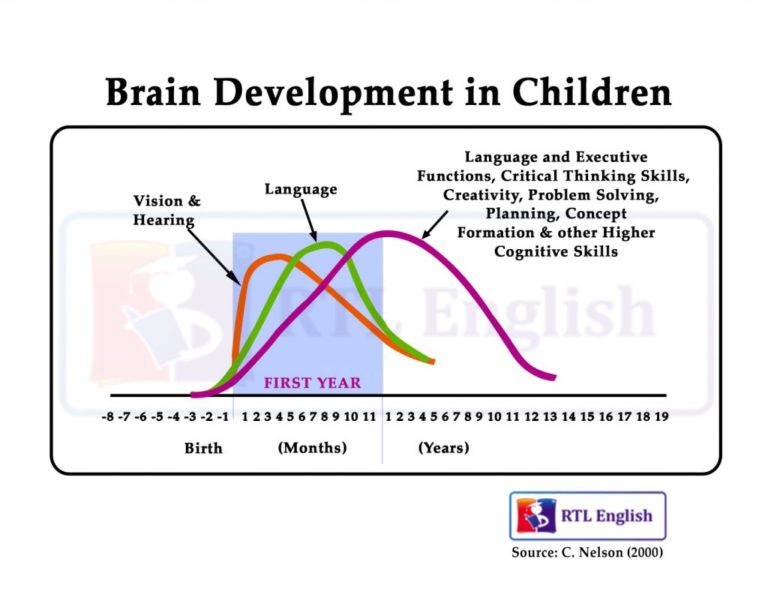
- Early & advanced English skills will make your child smarter.
- Early & advanced English skills will improve problem solving.
- Early & advanced English skills will improve planning, & abstract thinking skills.
- Early & advanced English skills will help develop complex idea comprehension.
- Early reading can help children compensate for modest levels of ability in other areas. (*Ref)
ON A PRACTICAL LEVEL, HOW IMPORTANT IS EARLY READING?
- Your son or daughter’s reading ability & vocabulary at 3 years old might predict his or her success in school in Barrow-in-Furness when they are 6 to 7 years old (*Ref).
- Your child’s reading ability at 6 to 7 years old might predict their success at 17 to 18 years old (*Ref)!
- Your child’s reading ability at 7 to 8 years old might determine their graduation from senior school in Barrow-in-Furness (*Ref).
ON THE OTHER HAND:
- Children who can’t read proficiently by 7 to 8 years old are four times more likely to leave school without a diploma/results than proficient readers (*Ref).
and:
- Children who are not taught Phonemic Awareness, & therefore have to rely on memory have difficulty beginning to read and continue to have difficulty with new words.
BUT, SURELY SCHOOL WILL TEACH MY CHILD TO READ? SO, WHY DO I NEED TO BOTHER?
If this is what you are thinking, then you should know that you cannot rely on schools, including those in Barrow-in-Furness …
- In the USA, almost 70% of children at school who are aged 9-10 years old cannot read proficiently (*Ref)!
- And, of those children, 33% of them read at only a very basic level, and 34% are reading at a very poor level (*Ref).
- It’s not very different in the UK, where over 100,000 children leave school illiterate(*Ref).
- Or in Australia, where 33% of students aged 11 years old fail to meet literacy benchmarks (*Ref).
- Or in Canada, where 42% of the entire adult population is only semi-illiterate (*Ref).
NO, YOU CANNOT RELY ON SCHOOLS.
But, why not?
- Teachers don’t always understand the basic building blocks of language & reading
- Teachers often don’t know how to teach English language concepts
- There just aren’t enough qualified teachers
- Classes are too large
- Kids don’t get enough one-on-one attention from teachers in the classroom
- Schools aren’t using the correct teaching systems – i.e they rely on rote learning or sight words
- Schools are overwhelmed & have tried to shift some of the burden of teaching onto apps and computers
UNFORTUNATELY, IT IS A FACT THAT:
Being illiterate is a guaranteed ticket to a dead end.
YOU NEED TO TAKE CHARGE OF YOUR CHILD’S EDUCATION – TODAY!
BUT HOW?
You can begin by teaching English to your son or daughter.
By Teaching your son or daughter to read your son or daughter will develop early reading skills that will help put them years ahead of other children in Cumbria. So, if you’ve decided that you want to become a proud parent of a happy & smart son or daughter, then you owe it to your son or daughter to teach them to read and improve their English.
WE HELP PARENTS TEACH ENGLISH TO CHILDREN
RTL English™ offers 600 easy-to-teach & downloadable English lessons for parents to teach to his or her child at home. Our workbook lessons will help your son or daughter to catch up, keep up and get ahead! Our workbooks also challenge more advanced students; so whatever your son or daughter’s ability, there’s sure to be an RTL English lesson workbook that’s suitable for them.
THE RTL ENGLISH CURRICULUM CONSISTS OF FIFTEEN YEARS (LEVELS) OF TEACHING MATERIALS WHICH INCLUDE SIX HUNDRED LESSON WORKBOOKS COMPRISING FOUR THOUSAND WORKSHEETS AND NINETEEN THOUSAND TEACHING INSTRUCTIONS & WILL SAVE YOU OVER TWO THOUSAND DAYS OF LESSON PREPARATION TIME!
Foundation Stage
Includes Level 1, 2 & 3.
Suitable for kids aged 3-6 years old in Barrow-in-Furness, Cumbria
Elementary Stage
Includes Level 4, 5 & 6.
Suitable for kids aged 6-9 years old in Barrow-in-Furness, Cumbria
Intermediate Stage
Includes Level 7, 8 & 9.
Suitable for kids aged 9-12 years old in Barrow-in-Furness, Cumbria
Upper Intermediate Stage
Includes Level 10, 11 & 12.
Suitable for kids aged 12-15 years old in Barrow-in-Furness, Cumbria
Advanced Stage
Incl. Level 10, 11 & 12.
Suitable for kids aged 15-18 years old in Barrow-in-Furness, Cumbria
Winning Awards Since 1996
With 24 years of research, development, dedication and experience, RTL English is committed to offering the best possible start to English language learners worldwide. RTL English is part of the Ready To Learn group, an international educational organisation with students worldwide.
Elaine Shannon founded Ready To Learn in 1996, and is an internationally respected author, language expert and School Principal with more than 40 years of specialist experience. Elaine & her team of instructional designers, linguists and educational experts developed the RTL English Curriculum.
What Happens In A Lesson?
- Each lesson is designed to last approximately 60 minutes. Normally, your child will spend 55 minutes participating in learning activities, and 5 minutes completing an achievement exercise that’s used to reinforce the lessons’ learning designs & objectives.
- Each lesson is accompanied by an RTL English lesson workbook. The workbook consists of six worksheets of instructional content and one reinforcement exercise page.
- You will use the workbook & teaching notes to guide and lead your child through the variety of learning activities in the workbook.
- Although all of our workbooks follow a similar format, each one is slightly more challenging than the last in the sequence. As a result, your child will be able to advance in small manageable steps & acquire English language skills that will last them a lifetime.
- There are 5 learning stages, 15 learning levels and 600 lessons in the RTL English curriculum.
- Your child will need to complete 36 lessons to finish one learning level – which lasts approximately 1 academic year.
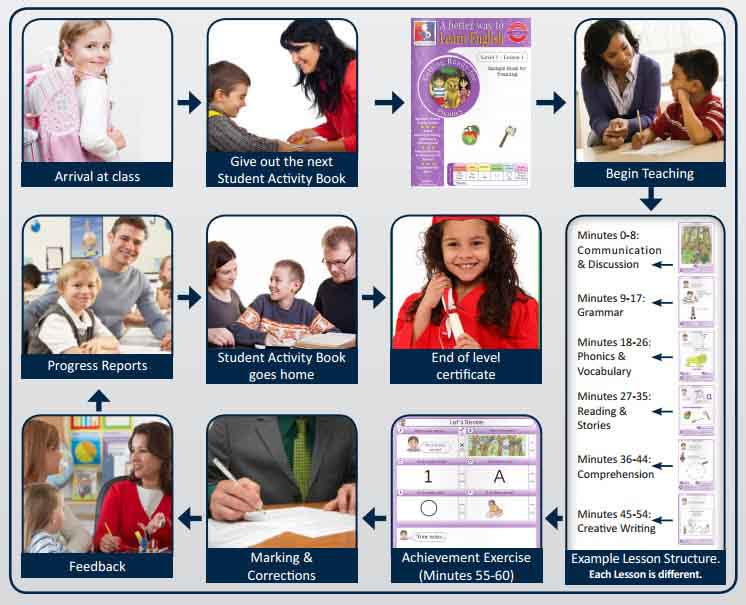
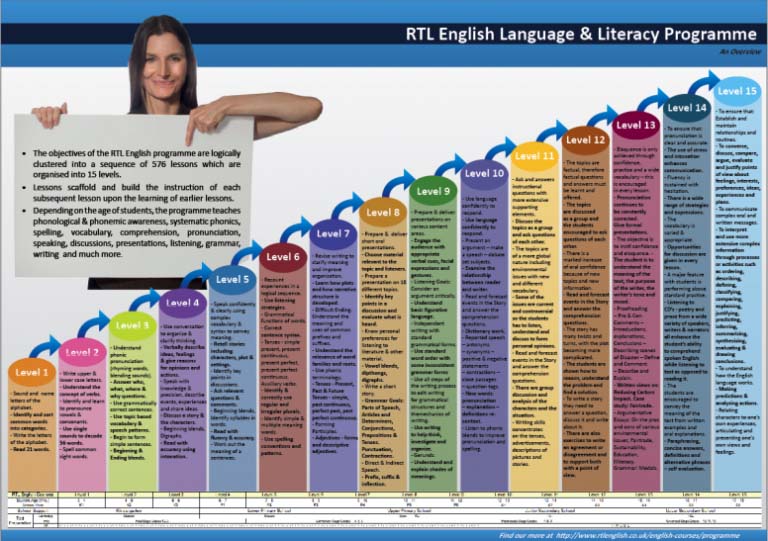
What Will My Child Be Taught?
It depends on your child’s age and their English language ability. To find out what your child will be taught, please click the grey button & then click the book cover that’s closest to your child’s current age → Lesson Workbooks
The RTL English Curriculum teaches all the communicative functions and language forms your child will need to succeed in school, exams and beyond, including:
- Phonemic Awareness
- Alphabetic Principle
- Systematic & Explicit Phonics
- Fluency with Text
- Proficient Grammar Knowledge
- Creative Writing
- Expanded Vocabulary
- Advanced Comprehension, and
- Confident Speaking Skills
The RTL English Curriculum: Kids 3 to 18 Years Old
Whatever your child’s age or English language ability, there is sure to be an RTL English course (aka ‘level’) that will help your child learn or improve his or her English. This is because our curriculum provides 15 years of learning for child aged 3 to 18 years old & teaches all the communicative functions and language forms your son or daughter will need to have a richer, more successful educational experience. RTL English will also supplement your son or daughter’s learning at their school in Barrow-in-Furness.
The RTL English Curriculum consists of 15 years (levels) of teaching materials which include 600 workbooks (comprising 4,000 worksheets & 19,000 teaching notes) & saves over 2,000 days of preparation time.
Level 1
Kids: 3-4 years old
36 lessons. 36 workbooks. 252 worksheets. 1134 teaching instructions.
Level 2
Kids: 4-5 years old
36 lessons. 36 workbooks. 252 worksheets. 1134 teaching instructions.
Level 3
Kids: 5-6 years old
36 lessons. 36 workbooks. 252 worksheets. 1134 teaching instructions.
Level 4
Kids: 6-7 years old
36 lessons. 36 workbooks. 252 worksheets. 1134 teaching instructions.
Level 5
Kids: 7-8 years old
36 lessons. 36 workbooks. 252 worksheets. 1134 teaching instructions.
Level 6
Kids: 8 -9 years old
36 lessons. 36 workbooks. 252 worksheets. 1134 teaching instructions.
Level 7
Kids: 9-10 years old
36 lessons. 36 workbooks. 252 worksheets. 1134 teaching instructions.
Level 8
Kids: 10-11 years old
36 lessons. 36 workbooks. 252 worksheets. 1134 teaching instructions.
Level 9
Kids: 11-12 years old
36 lessons. 36 workbooks. 252 worksheets. 1134 teaching instructions.
Level 10
Teens: 12-13 years old
36 lessons. 36 workbooks. 252 worksheets. 1134 teaching instructions.
Level 11
Teens: 13-14 years old
36 lessons. 36 workbooks. 252 worksheets. 1134 teaching instructions.
Level 12
Teens: 14-15 years old
36 lessons. 36 workbooks. 252 worksheets. 1134 teaching instructions.
Level 13
Teens: 15-16 years old
36 lessons. 36 workbooks. 252 worksheets. 1134 teaching instructions.
Level 14
Teens: 16-17 years old
36 lessons. 36 workbooks. 252 worksheets. 1134 teaching instructions.
Level 15
Teens: 17-18 years old
8 lessons. 8 workbooks. 56 worksheets. 252 teaching instructions.
Can I See A Lesson Workbook?
There are 600 workbooks like the one below. Lesson 19, Level 1 below suits children between 3 and 4 years old. To see an example of a lesson workbook that is likely to suit your child, please click the grey button & then click the book cover that’s closest to your child’s current age → Lesson Workbooks
What Method Do You Use?
- We teach using a Step-by-Step method. The content of each lesson is determined by an 8-page workbook that’s slightly more challenging than the last in the sequence. Lessons ‘scaffold’ and build upon the learning of the previous lesson. As a result, students advance in small, manageable steps and acquire English language skills that enable them to achieve better results in school, exams & beyond..
- Sequenced instruction is organised into 5 developmentally appropriate stages, 15 levels of increasing difficulty and 600 lessons. Each lesson provides one hour of learning per week and follows a workbook that consists of six worksheets with instructional content and one reinforcement exercise page.:
- Each lesson is accompanied by a workbook follows a similar plan:
- Page 1 :: Communication/ Discussion/ Topic orientated
- Page 2 :: Grammar/ Language
- Page 3 :: Phonics/ Vocabulary
- Page 4 :: Reading (Ongoing Story)
- Page 5 :: Story Comprehension/ Language
- Page 6 :: Grammar/ Language Exercise
- Page 7 :: Achievement Exercise / Assessment
- Depending on your child’s age and their English skills, instruction will typically consist of a variety of activities including speaking, listening, letter-sound correspondence, sight words, guided oral reading, text comprehension, creative writing, grammar and critical thinking.
- You don’t need to prepare anything or create teaching materials for an RTL English lesson. It’s all been done for you. Each page of this workbook contains teaching notes to enable you to guide and lead your child through the learning activities. Once your son or daughter has finished their lesson, record their achievements in the progress report form and then simply print the next workbook in the sequence.
Will My Child Learn Phonics?
- Yes! We teach synthetic & analytical phonics which includes 44 basic phonemes, 22 beginning blends and 15 ending blends.Our students learn and practise phonics throughout our Foundation, Elementary, Intermediate and Upper Intermediate stages. Our Advanced stage uses phonics to teach pronunciation.
- We pay particular attention to blended consonant sounds (that are located at the beginning and end of many words). We teach vowels first and then consonants. As soon as possible we teach children to read. In practice this means after students have learnt 5 vowel sounds and 2 consonants they can read a few words by themselves. Children are also taught how to decode words, so from the very beginning they can see new simple words and know how to read them.
Barrow-in-Furness is a town in Cumbria, North-West England. Historically allocation of Lancashire, it was incorporated as a municipal borough in 1867 and merged next Dalton-in-Furness Urban District in 1974 to form the Borough of Barrow-in-Furness. At the tip of the Furness peninsula, close to the Lake District, it is bordered by Morecambe Bay, the Duddon Estuary and the Irish Sea. In 2011, Barrow's population was 57,000, making it the second largest urban Place in Cumbria after Carlisle. Natives of Barrow, as capably as the local dialect, are known as Barrovian.
In the Middle Ages, Barrow was a small hamlet within the parish of Dalton-in-Furness in the tell of Furness Abbey, now on the outskirts of the modern-day town, controlling the local economy back its dissolution in 1537. The iron prospector Henry Schneider arrived in Furness in 1839 and, with other investors, opened the Furness Railway in 1846 to transport iron ore and slate from local mines to the coast. Further hematite deposits were discovered, of satisfactory size to develop factories for smelting and exporting steel. For a epoch of the late 19th century, the Barrow Hematite Steel Company-owned steelworks was the world's largest.
Barrow's location and the availability of steel allowed the town to manufacture into a significant producer of naval vessels, a shift that was accelerated during World War I and the local yard's specialisation in submarines. The original iron- and steel-making enterprises closed down after World War II, leaving Vickers shipyard as Barrow's main industry and employer. Several Royal Navy flagships, the immense majority of its nuclear submarines as skillfully as numerous supplementary naval vessels, ocean liners and oil tankers have been manufactured at the facility.
The grow less of the Cold War and subsequent stop in military spending saw tall unemployment in the town through nonattendance of contracts; despite this, the BAE Systems shipyard remains effective as the UK's largest by workforce (9,500 employees in 2020) and is now undergoing a major progress associated afterward the Dreadnought-class submarine programme. Today Barrow is after that a hub for vigor generation and handling. Offshore wind farms form one of the highest concentrations of turbines in the world, including the second largest offshore farm, with multiple working bases in Barrow.
Academic References
- The Cognitive Foundations of Learning to Read: A FrameWork Sebastian Wren
- The relatonship of phonemic awareness to reading acquisiton: more consequence than preconditon but still important. Wimmer H, Landerl K, Linortner R, Hummer P. University of Salzburg, Austria.
- NAEP 1998 Reading Report Card for the Nation and the States March 1999 Authors: Patricia L. Donahue, Kris n E. Voelkl, Jay R. Campbell, and John Mazzeo
- National Institute of Child Health and Human Development. (2000). Report of the National Reading Panel. Teaching children to read: An evidence-based assessment of the scientific research literature on reading and its implications for reading instruction (NIH Publica on No. 00-4769). Washington, DC: U.S. Government Prin ng Office.
- Wikipedia: http://en.wikipedia.org/wiki/Functional_illiteracy
- J Learn Disabil. 2009 Sep-Oct;42(5):392-402. Epub 2009 Jun 19. Why elementary teachers might be inadequately prepared to teach reading. Joshi RM, Binks E, Hougen M, Dahlgren ME, Ocker-Dean E, Smith DL.
- Australia Government Department of Educa on, Science and Training: htt p://www.dest.gov.au/archive/schools/literacy&numeracy/charts.html
- CBC News: Canada’s Shame – h p://www.cbc.ca/news/background/educa on/canada-shame.html
- The Timing and Quality of Early Experiences Combine to Shape Brain Architecture Center on the Developing Child, Harvard University
- Vocabulary Development and Instruc on: A Prerequisite for School Learning Andrew Biemiller, University of Toronto iii. Early reading acquisiton and its relation to reading experience and ability 10 years later. Cunningham AE, Stanovich KE.
- Double Jeopardy How Third-Grade Reading Skills and Poverty Influence High School Gradua on Donald J. Hernandez, Hunter College and the Graduate Center
- What Reading Does for the Mind ANNE E. CUNNINGHAM and KEITH E. STANOVICH

